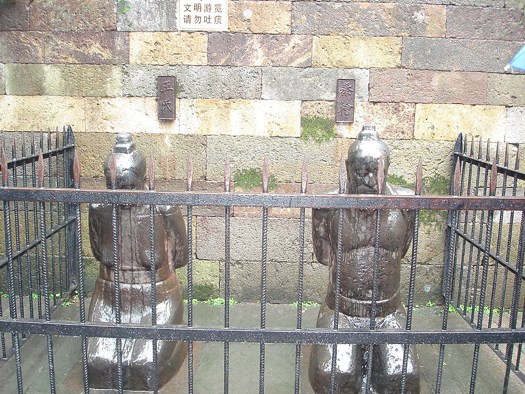Qin Hui, Lady Wang and the Murder of Yue Fei

Chinese history, being long and populated by thousands of characters, gets very confusing very quickly. Still some stories from Chinese history do manage to stand out brightly in modern Chinese culture. One of them has to do with an evil minister, his evil wife and the murder of one of China’s greatest heroes. Sounds not unlike the story of MacBeth, no? The great stories are like that…they have resonance across cultures. But before I go all Joseph Campbell on you, let’s get to the story. Since it’s China, we need to back up a little since there’s always, always a backstory in Chinese history…even to the backstory.
That backstory starts in the Song Dynasty (960 A.D. – 1279 A.D.), a roughly 300-year period of Chinese history in which the country was united under a single Emperor. Here I should interject that Chinese history overall can be seen as one long story of splintering and reuniting, splintering and reuniting as corrupt emperors and/or administrators tear China apart and virtuous reformers bring it back together again. “The Empire, long divided, must unite: long united, must divide” is in fact the opening line of Romance of the Three Kingdoms, a Chinese historical novel I referenced not very long ago here on joepastry.com.
The Songs dramatically united China when they arrived on the historical scene, but of course it was not to last as the dynasty eventually fell into the hands of a weak emperor, one Qinzong of Song, which is fun to say. What happened? The short version is that he tried unsuccessfully to negotiate with a rising tribal power in the West, the Jurchens. The Jurchen response to Qinzong’s entreaties was to sack the Song capital at Kaifeng and take the Emperor and much of his family captive. China was cut in half as the Jurchen — now known as the “Jin” — took over the north and set up their own dang dynasty. So there!
The surviving members of the Song dynasty retreated south and set up Southern Song with a new emperor (named Gaozong) south of the Huai River. This didn’t sit well with many Chinese patriots, among them a fiercely idealistic young fellow by the name of Yue Fei, who swore to drive the Jin out of China and reunite the Empire. It wasn’t long before Yue started making good on his promise, working his way to the rank of General and instigating a series of brilliant campaigns against the Jin. That was OK by Emperor Gaozong, at least until Yue began to press into the North and take back old Song territory. Why was that a problem? Because the old Emperor Qinzong was still alive. Gaozong did the calculus and realized that if the Jin were completely defeated and the old Emperor restored, he’d be out of a job.
Enter one Qin Hui, the opportunistic Chancellor of Southern Song, who plotted with Gaozong to dispose of the noble Yue. According to legend, on the day Yue was in sight of Kaifeng — poised to re-take it — he received twelve golden plates from Gaozong along with an order to return to Southern Song. What could he do? The Emperor beckons. On his arrival Yue and his son were promptly arrested and thrown in prison on trumped up charges. This didn’t completely solve Gaozong’s problem since Yue would eventually have to be released if his jailers failed to elicit a confession in two months. Not surprisingly the virtuous Yue withstood two full months of torture, creating something of a crisis.
As the story goes, one morning Qin was wringing his hands before the east window of his drawing room, wondering what to do about his predicament when his wife, the evil Lady Wang, suggested a plan: slip the jailer a phony execution order from the Emperor inside the skin of the orange she happened to be eating — the whole problem would be solved by lunchtime. Perfecto! And so it was. The sordid affair would become known as the “East Window Plot”, and would earn Qin and Wang the enmity of historians ever after. For it wasn’t long after Qin’s death of old age, when a new Emperor had assumed the throne, that Yue Fei was posthumously exonerated of his crimes.
A grand tomb was erected to honor Yue Fei, a feature of which was a dais upon which stood iron statues of Qin Hui and Lady Wang with their hands bound behind them, kneeling in disgrace, being dealt the punishment they never received in life. For centuries ordinary Chinese have visited specifically to spit (or worse) on the pair, who remain embodiments of the kind of administrative selfishness and corruption that is forever tearing China apart. And every morning, so it’s said, the pair are fried in effigy millions upon millions of times, as street vendors make youtiao, since that’s what the two sides of the pastry allegedly represent.
You never fail to entertain me AND educate me too. Great story and connection to the youtiao.
I used to read a lot of chinese history when I was a child – it was compulsory in my school then and it was marvellously interesting. It’s been a long time since. I love that you are willing to share these little nuggets of rich chinese history with us. Really appreciate it. Thanks!